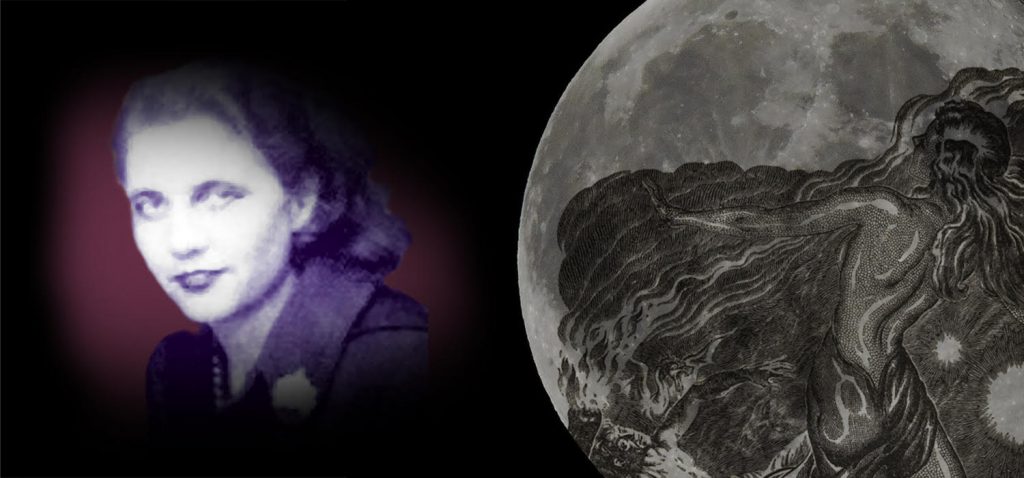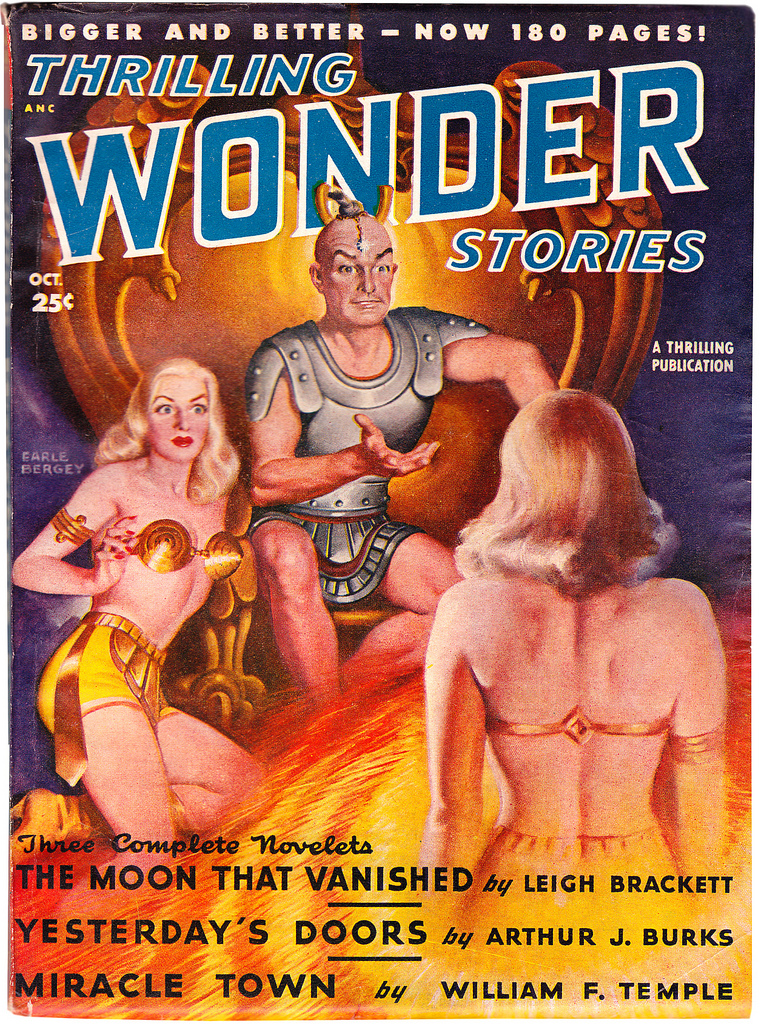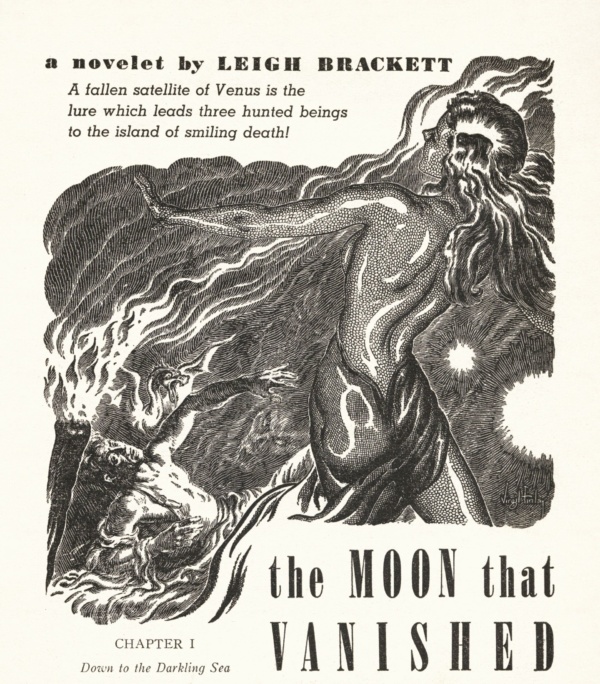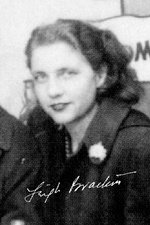
Short Sorcery: Leigh Brackett’s “The Moon That Vanished”
by Bill Ward
From the start, from the very title itself, the reader is presented with a mystery in Leigh Brackett’s “The Moon That Vanished.” For one thing the story’s setting of Venus – think the Venus of Edgar Rice Burroughs rather than that of NASA probes – has no moon. But there is much more going on than that. The protagonist, David Heath, is himself disoriented; slumped stupefied in the Venusian equivalent of an opium den and vaguely wondering why some dangerous barbarian is asking about him. Not that he cares, for “[t]he dead and the mad do not care.”
Heath is taboo – persona non grata for the human population of Venus, a complete outcast. Again, we do not know why. We do know that the menacing barbarian who drags him out of the den of vice that is the Palace of All Possible Delights implies that Heath, the captain of a sailing ship, has found something called the Moonfire. This is what has made him a pariah, and it seems that this is what also cost him his great love, Ethne. But are the visions that torment Heath merely the shadows of trauma, or something else? When he briefly seems to transform into more than his ruined, broken self – when he becomes godlike for a split second – is it something in the alien narcotics, or a power within Heath himself?

“Darkness on Venus is not like the darkness of Earth or Mars. The planet is hungry for light and will not let it go. The face of Venus never sees the sun but even at night the hope and the memory of it are there, trapped in the eternal clouds.” The three central characters of “The Moon That Vanished” are themselves each hungry for a kind of light, for the legendary Moonfire, an ancient, sacred power that legend states can transform mortal into god. Broca, the brazen upland warrior that locates and presses Heath into his service, wants power in excess of any tribal chief. Alor, his lover and runaway temple slave of the Guardians of the Mysteries of the Moon, wants safety and end to the pursuit by her former masters. Heath, once back aboard his ship and instilled with a new sense of purpose, wants to end his suffering by finishing what he had started years ago – by journeying to the heart of the Moonfire even though it may take his life, as it once took the life of the woman he loved.
And so the mystery at the heart of the story propels the voyage forward, with Brackett carefully apportioning out information when and where we need it. And over the course of the journey through exotic and perilous seas, pursued by hostile Children of the Moon and menaced by deadly alien fauna, a love triangle develops between our protagonists. Alor, beautiful and hunted, draws away from her savage protector, fascinated by Heath’s love “of a shadow,” of his own lost Ethne. Tension between the crew, the peril of the pursuit, and the building suspense of their ultimate goal ratchet up the stakes with every subsequent scene.
Brackett’s mastery doesn’t just extend to pace, her prose itself embodies the best of the pulp style while avoiding its excesses. Here is a Venusian sunrise:
“It came slowly, sifting down like a rain of jewels through the miles of pearl-grey cloud. Cool and slow at first, then warming and spreading, turning the misty air to drops of rosy fire, opaline, glowing, low to the water, so that the little ship seemed to be drifting through the heart of a fire-opal as vast as the universe.
The sea turned color, from black to indigo streaked with milky bands. Flights of the small bright dragons rose flashing from the weed-beds that lay scattered on the surface in careless patterns of purple and ochre and cinnabar and the weed itself sired with dim sentient life, lifting its tendrils to the light.”

It’s both concise and evocative, little wonder when you consider that Brackett wasn’t just the ‘Queen of Space Opera,’ but a successful crime novelist and screenwriter, most famously as a script writer for The Big Sleep. Here she is describing the fanatics of the Venusian moon cult in hardboiled style:
“They were tall men. They wore tunics of black link mail with the rayed symbol of the Moon blazed in jewels on their breasts. They rode the pitching deck, their silver hair flying loose in the wind, and their bodies were as the bodies of wolves that run down their prey and devour it.”
But these same dangerous fanatics won’t land on the island Heath and company finally make landfall on, the island of the Moonfire itself. The climactic encounter with the mysterious force – itself the radiant energy of a one-time Venusian moon long ago crashed upon the planet’s surface – is played out in psychological terms, resolving the tensions Brackett has carefully built up over the journey. The Moonfire really can make one godlike – at least on an illusory level. Those that find themselves within the radius of the mysterious glowing gas discover that they can conjure their every dream and whim into reality.
As the many smiling corpses Heath discovers on the island can attest, such seductive power is compelling to the point of fatal distraction. Here, then, is why no one returns from the Moonfire – no one has the strength the resist the temptations of absolute creation. And those who pick up even a shade of the Moonfire’s power – people like Heath – are shunned as those accursed by the gods, for they can still vividly see the shadows of their dearest desires, but have no ability to make them real. Within the Moonfire itself, though, anything at all is possible.
Broca creates for himself a splendid barbarian kingdom, a hierarchy in endless service to himself, with Alor attached as ornament. Heath embraces the chance to summon his own desire, to go to his death immersed in a pleasant illusion far more potent than any found at the Palace of All Possible Delights. But, when his heart reaches for what it yearns most for, it is not departed Ethne that emerges from the Moonfire mist to greet him, but Alor.
Heath is reborn in that moment – not as a godling summoning forth pleasurable distractions, but as a human being cleaving to what is of real worth in this world. His confrontation with Broca becomes one of renouncing – of refusing to use the nearly-impossible-to-resist power of the Moonfire against him. Broca, in the end, lets both Heath and Alor go – for neither can really compare to the intoxication of his own imagination.

“The Moon That Vanished” combines the pace and exoticism that is the hallmark of the planetary romance with great thematic imagery and astute psychological conflict. A story of a fantastical, fantasy-granting premise that is only overcome when two people decide that mutual love in the warts-and-all real world beats losing yourself in a compelling illusion. As Heath and Alor emerge from the Moonfire and are allowed to pass by the Children of the Moon, the latter note a change in them both. But it isn’t the ‘godlike’ status of those possessed by an alien puissance, it’s rather the serene countenance of two who have given up the universe of possibilities for something actually real; the love reflected in each others eyes.


